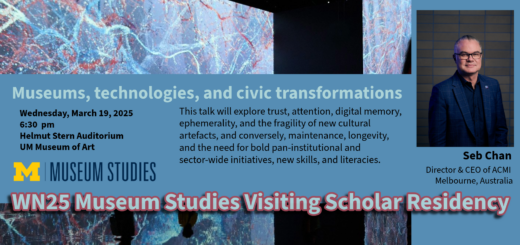Public programs facilitate dialogue between academics and professionals, informing scholarship and strengthening practice.
Multiple day conferences, year-long colloquia, individual lectures, “conversations” between individuals, hands-on workshops, and Museums at Noon talks featuring our graduate students all contribute to the remarkable richness of MSP offerings.
Video recordings of some MSP lectures are archived for viewing in our Media Gallery.
Lectures
What Do Curators Know?
Michigan League Ann Arbor, MITuesday, March 27 at 6:30 pm Michigan League (Michigan Room) Presentation by Steven Lubar Professor of American Studies, History of Art and Architecture, and History, Brown University and Museum Studies Program Visiting Scholar Curators are experts on an astonishing range of topics. But what else...
Using Racist Memorabilia to Teach Tolerance and Promote Social Justice: the Case of the Jim Crow Museum
U-M Museum of Art, Helmut Stern Auditorium 525 S. State St., Ann Arbor, MI, United StatesThe Jim Crow Museum is the nation’s largest publicly accessible collection of racist artifacts. Located on the campus of Ferris State University in Big Rapids, Michigan, the museum houses more than 12,000 objects—primarily, but not exclusively, segregation era artifacts and everyday anti-black caricatured objects....
A Swift Death and Steady Resurrection: Salvage Anthropology and U.S. Museums
U-M Museum of Art, Helmut Stern Auditorium 525 S. State St., Ann Arbor, MI, United StatesPresentation by Samuel J. Redman What should museums do with stolen artifacts? Should the response be similar with stolen knowledge? This talk explores the history and legacy of salvage anthropology as it relates to museums in the United States. Salvage anthropology was a movement...
Listening to Object Witnesses: Decolonizing Research in Museum Collections
U-M Museum of Art, Helmut Stern Auditorium 525 S. State St., Ann Arbor, MI, United StatesPresentation by Dr. Margaret M. Bruchac How do Indigenous objects in museum collections speak to those who collect, curate, observe, and claim them? The observable materials and patterns of construction obviously reflect particular ecosystems, cultures, and technologies, but do these objects also retain memories...
Reimagining Detroit’s Museum and Cultural District
Online via ZoomIn its Midtown district, Detroit boasts a concentrated set of high-powered cultural institutions. Clustered around the DIA, they include the Detroit Historical Museum, The Charles H. Wright Museum of African American History, the Michigan Science Center, and the Detroit Public Library. In recent years,...
Colonial Archives and Decolonial Museology – Panel 1
Online via ZoomIn this series of two webinars, we inquire into the University of Michigan’s archives, museums, visual and living collections to ask how they are implicated in the violent histories of settler colonialism in the United States and US colonialist rule over the Philippines. How...
Colonial Archives and Decolonial Museology – Panel 2
In this series of two webinars, we inquire into the University of Michigan’s archives, museums, visual and living collections to ask how they are implicated in the violent histories of settler colonialism in the United States and US colonialist rule over the Philippines. How...
Terribly Close: Polish Vernacular Artists Face the Holocaust
Online via ZoomPresentation by Erica Lehrer, Concordia University Can inanimate objects store and communicate traumatic memory that cannot be directly expressed? This talk examines 'folk art' made by non-professional Polish artists – many of them village laborers – documenting the German Nazi occupation of Poland and...
Accessibility and Museums: Creating Inclusive Experiences
Online via ZoomOver the past decade, the American Alliance of Museums (AAM) has promoted accessible methods in museum operations from collections management to exhibition design. The UM Museum Studies Program is pleased to share in this important conversation regarding audience engagement with this session on accessibility...
What’s the Object of this Museum? Everyday Resistance at the National Public Housing Museum
U-M Museum of Art, Helmut Stern Auditorium 525 S. State St., Ann Arbor, MI, United StatesPlease join us for a presentation by this year's Museum Studies Program visiting scholar, Lisa Yun Lee, Executive Director, National Public Housing Museum (Chicago) Worker cooperatives to build a solidarity economy, contemporary art that grapples with history and unleashes radical imaginations about our collective futures, everyday...




